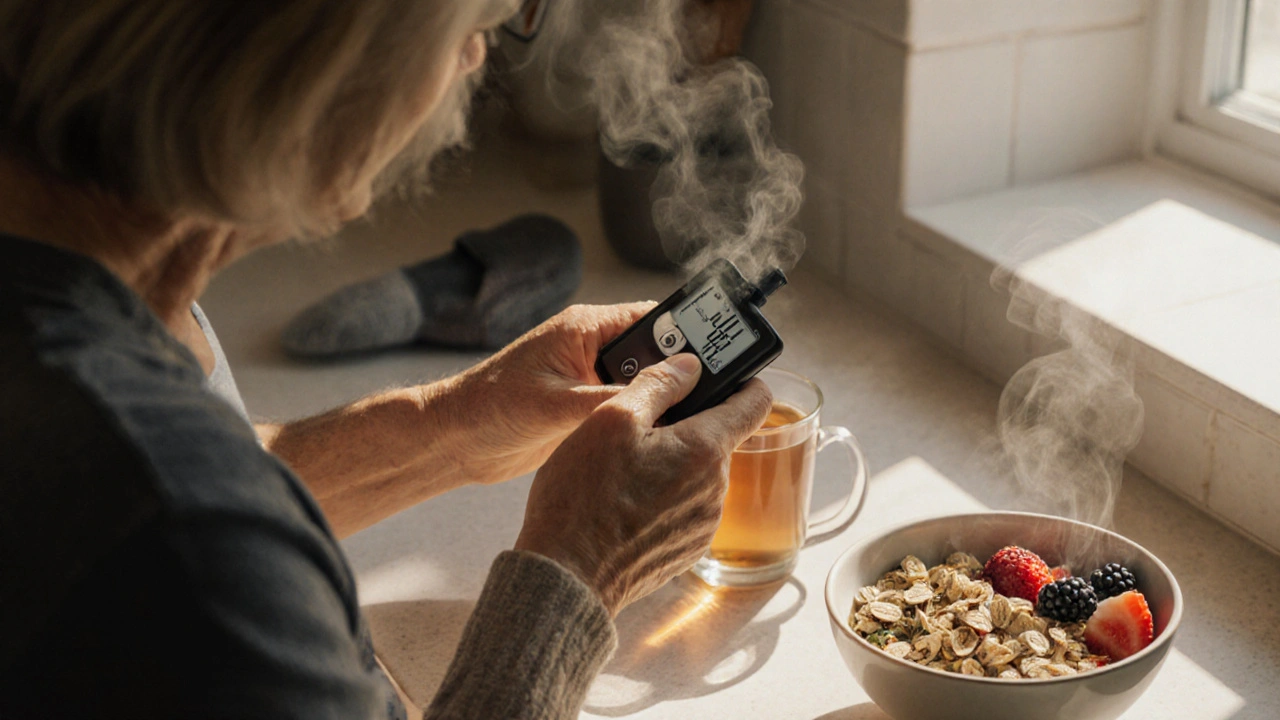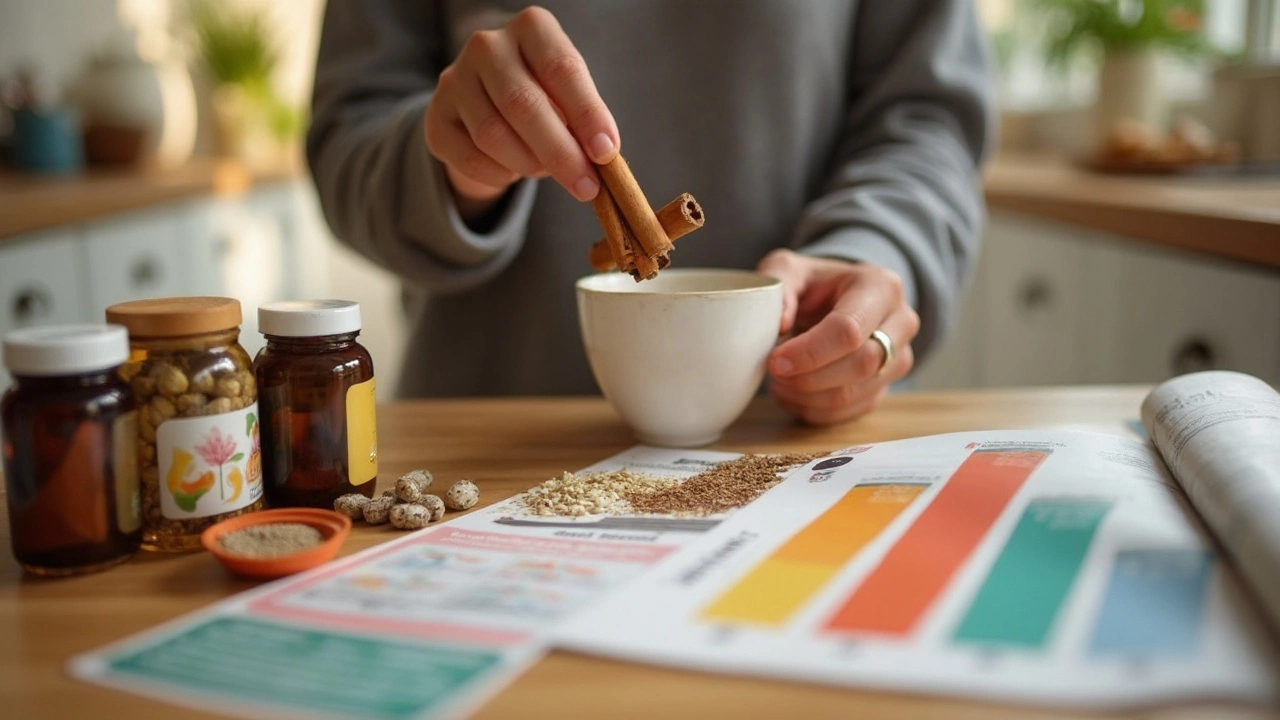Diabetes: Simple, Practical Steps to Better Blood Sugar
Diabetes changes how your body handles sugar every day, and small choices can make a big difference. This page gives down-to-earth, useful advice on managing blood sugar, understanding common medicines, and what to expect if you want to try herbal options like cinnamon or fenugreek.
Daily habits that move your numbers
Check your blood sugar regularly so you know how food, activity, and stress affect you. Use a meter or continuous glucose monitor and track patterns for a week before making big changes. Aim for consistent meal timing and balanced plates: a mix of protein, fiber, and healthy fats slows sugar spikes more than focusing only on cutting carbs.
Move in ways you enjoy — brisk walks, cycling, or short strength sessions three times a week all help insulin work better. Sleep matters: poor sleep raises blood sugar and hunger. Manage stress with simple tools you can keep doing, like 10 minutes of deep breathing or a short walk after meals.
Medication matters when lifestyle isn’t enough. Metformin is a common first choice because it lowers liver glucose production and improves insulin sensitivity. If you’re on medication, don’t stop it without talking to your prescriber — sudden changes can cause unsafe sugar swings.
Herbal options & what the science says
Some people look to herbs for extra help. Cinnamon and fenugreek are the best-known examples. Small clinical trials show they can lower fasting blood sugar modestly for some people, but results vary and effects are usually smaller than prescription drugs. Think of herbs as possible add-ons, not replacements for proven medicines unless your doctor agrees.
Dosage and quality matter. Supplements aren’t regulated like medicines, so check labels and choose brands with third-party testing when possible. Fenugreek seeds added to food or as a standardized extract have been studied most; cinnamon types and amounts differ between trials, which explains mixed results. Also watch for drug interactions — some herbs can change how medicines work or affect blood clotting.
Practical steps if you’re curious about herbs: 1) Talk to your healthcare provider and show recent glucose or A1c results; 2) Start one supplement at a low dose and monitor your numbers closely; 3) Keep a food and symptom log to spot changes; 4) Stop and call your provider if you have dizziness, fainting, or unexplained low sugars.
Want a focused read on herbs? Check our article “Best Herbal Metformin Alternatives: Cinnamon, Fenugreek & More for Blood Sugar Control” for a closer look at evidence, dosages, and real-world tips.
Managing diabetes is about steady, measurable steps. Track what you do, compare results over weeks, and partner with your healthcare team. Small, consistent changes add up to better control and fewer surprises.

How to Prevent SGLT2 Inhibitor Genital Infections with Hygiene, Hydration, and Timing
SGLT2 inhibitors help manage diabetes and protect your heart and kidneys-but they can cause genital infections. Learn how simple hygiene, hydration, and timing can cut your risk by up to 40% without stopping your medication.

Choosing a Sulfonylurea: Which One Has the Lowest Hypoglycemia Risk?
Not all sulfonylureas are the same. Glipizide has far lower hypoglycemia risk than glyburide or glimepiride. Learn which drug is safest for older adults, kidney patients, and those with irregular meals.
-
30.12.25 -
Alistair Mukondiwa -
15

Blood Sugar Control and Diabetic Peripheral Neuropathy: Key Management Strategies
Learn how tight blood sugar control can prevent and ease diabetic peripheral neuropathy. Get practical tips on targets, lifestyle changes, meds, and monitoring for better nerve health.
-
2.10.25 -
Alistair Mukondiwa -
6

Best Herbal Metformin Alternatives: Cinnamon, Fenugreek & More for Blood Sugar Control
This article dives deep into the clinical evidence behind using common botanicals like cinnamon and fenugreek as natural alternatives to Metformin for managing blood sugar. It unpacks the science, real-world experiences, and useful tips on effective herbal supplements, and guides readers through what to expect if they're considering such substitutes. Enjoy an engaging, fact-filled read with practical advice and reliable information for anyone interested in natural glycemic control options.
-
29.04.25 -
Alistair Mukondiwa -
11
- Drug Information (69)
- Health and Wellness (59)
- Pharmacy Information (25)
- Medical Conditions (23)
- Supplements (4)
- Diabetes (4)
- Travel Health (3)
- Mental Health (3)
- Heart Health (2)
- Parenting (2)
-
Choosing a Sulfonylurea: Which One Has the Lowest Hypoglycemia Risk?
30 Dec 2025 -
RSV Infections: Risks for Infants, Older Adults, and How to Prevent Them
24 Feb 2026 -
Managing Warfarin and Antibiotics: What You Need to Know About Dangerous Interactions
22 Dec 2025 -
How genericday.com Makes Online Pharmacies Safer and Cheaper for Prescription Drugs
27 Jul 2025 -
Assistive Technology for ADHD Students: Practical Tools and Tips
29 Sep 2025

2.02.26
Alistair Mukondiwa
0